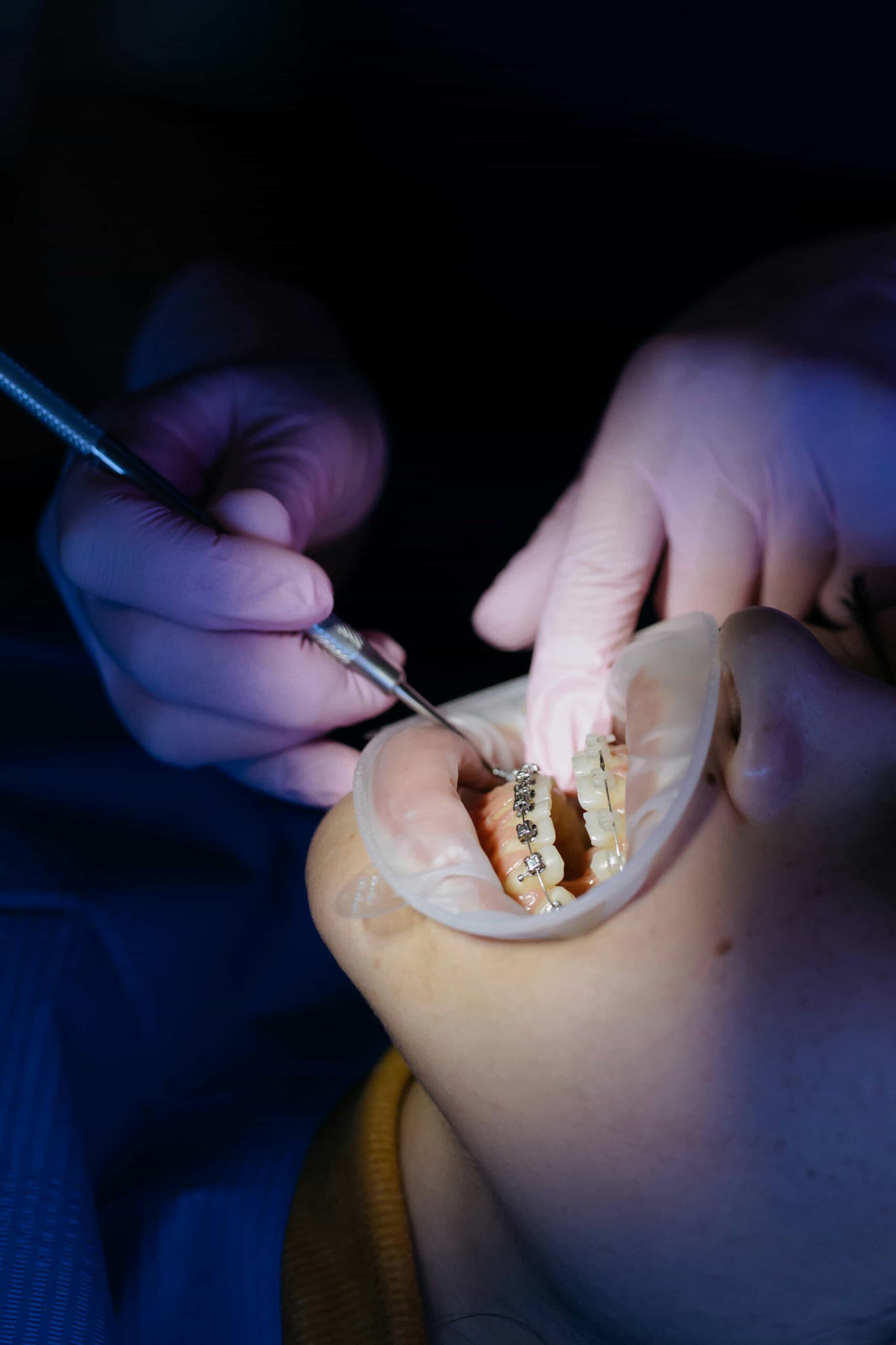Crooked teeth are a common concern for many individuals, from children to adults. Whether you’ve just noticed misaligned teeth in your child or have been self-conscious about your smile for years, understanding why teeth become crooked is the first step toward achieving a healthy, straight smile.
This guide explores what causes crooked teeth, why addressing the issue is beneficial, and what you can do to fix it.
Let’s take a look.
Key Takeaways
- Crooked teeth are caused by a variety of factors, including genetics and childhood habits.
- Orthodontic solutions like braces and aligners can correct crooked teeth and improve overall oral health.
- It is never too late to fix crooked teeth and achieve a brighter, healthier smile.
- Scheduling a consultation with an orthodontist is the first step towards correcting crooked teeth.
- An experienced team of professionals at Scaffidi Orthodontics can guide patients through the process of achieving their dream smile.

What Causes Crooked Teeth?
Crooked teeth occur for a variety of reasons, ranging from genetics to habits during childhood. Here are the most common causes to help you better understand what makes your teeth crooked.
1. Genetics and Heredity
Some of us inherit more than just our eye color or hair texture from our parents. Genetics play a significant role in determining tooth size, jaw structure, and alignment.
If your family has a history of crooked teeth or crowded jaws, you may find the same traits passed down to your or your child’s smile.
2. Thumb-Sucking or Pacifier Use
Thumb-sucking or prolonged use of pacifiers during infancy can impact the alignment of a child’s developing teeth.
These habits place pressure on the gums and teeth, potentially causing front teeth to protrude or become misaligned.
3. Early or Late Loss of Baby Teeth
Baby teeth serve an essential role as placeholders for permanent teeth. If baby teeth are lost too early (due to decay or injury), the surrounding teeth may shift into the gaps and restrict space for permanent teeth to grow correctly.
Similarly, holding onto baby teeth for too long can block the proper alignment of permanent teeth.
4. Jaw Size and Structure Issues
Modern diets often consist of softer foods, which require less chewing effort compared to the tougher, rawer foods eaten by early humans. This change has led to a gradual reduction in jaw size across generations.
For some people, a smaller jaw means less space for teeth to grow properly, leading to overlapping or crooked teeth.
5. Improper Oral Habits
Certain habits like tongue-thrusting, mouth-breathing, or chewing on pens can exert uneven pressure on teeth over time, potentially impacting their alignment.
Improper oral habits can also include prolonged use of a pacifier or thumb-sucking in childhood. These habits can alter the shape of the jaw and affect the positioning of teeth. In some cases, these habits may be difficult to break without professional intervention.
6. Misalignment of Jawbones
Known as malocclusion, this occurs when the upper and lower jaws are not properly aligned.
This can result in overbites, underbites, or crossbites, which affect how the upper and lower teeth fit together and may lead to crooked teeth.
7. Facial Trauma or Injuries
Accidents that cause trauma to the face or jaw can directly affect tooth alignment. For example, a jaw injury may shift teeth or misalign the overall dental structure.
Therapies that help realign teeth and restore facial features are often used to treat such cases.
8. Wisdom Teeth
When wisdom teeth erupt, they can sometimes create pressure and push existing teeth out of alignment, especially if there isn’t enough room in the jaw.
Treatments for wisdom teeth usually involve extraction to prevent potential complications, such as crowding and misalignment.
Why are My Teeth Crooked? Does it Matter?
Crooked teeth can be caused by a variety of factors, including genetics, oral habits, and developmental issues.
In some cases, they may not cause any problems and simply add character to an individual’s smile.
Crooked teeth are not just a cosmetic concern but can also affect overall oral health, self-esteem, and daily function. Here’s why understanding why are my teeth crooked is worth your attention.
- Oral Health: Misaligned teeth can be harder to clean, increasing the risk of cavities, gum disease, and bad breath.
- Chewing and Speech Issues: Crooked teeth may affect how you bite, chew, or even speak, potentially leading to discomfort or difficulty communicating.
- Jaw Strain: Misalignment can cause stress on your jaw, leading to temporomandibular joint (TMJ) disorders or headaches.
- Self-Confidence: A straight, aligned smile can enhance self-esteem and confidence in social or professional settings.
How Can Crooked Teeth Be Fixed?
The good news is that crooked teeth are treatable! Straightening your or your child’s teeth can significantly improve both appearance and function.
Here’s how orthodontic care, such as that offered at Scaffidi Orthodontics, can help resolve misalignment issues:
1. Traditional Metal Braces
Traditional braces are a tried-and-true method for realigning teeth using brackets and wires to gradually shift teeth into their correct positions. This approach is often the most effective for more severe cases of misalignment and can be used on patients of all ages.
2. Ceramic Braces
Ceramic braces work similarly to traditional metal braces but use tooth-colored or clear brackets, making them less noticeable on the teeth. They also have the same level of effectiveness as metal braces, but are a more aesthetically pleasing option for those looking to straighten their teeth.
Ceramic braces are a popular choice among adults and teenagers who want the benefits of traditional braces without the noticeable appearance of metal brackets on their teeth.
3. Clear Aligners
Clear aligners are a popular option for teens and adults seeking a discreet way to straighten smiles. These removable trays allow for flexibility and comfort while delivering effective results.
Made from a clear plastic material, clear aligners are virtually invisible and can easily be removed for eating, drinking, and brushing. These aligners are custom-made to fit your teeth and gradually move them into the desired position.
4. Retainers
While often used after braces, retainers can also help correct minor alignment issues. Retainers are crucial for maintaining the results of any orthodontic treatment.
These custom-made, removable devices are worn after the braces are removed and help keep your teeth in their new positions. Retainers can be either fixed or removable, depending on your specific needs.
5. Advanced Treatment
The In-Ovation R system is an advanced treatment option for patients seeking a more discreet and efficient orthodontic treatment.
This self-ligating system uses a unique clip to hold the wire in place, reducing friction and allowing teeth to move more freely.
Why Scaffidi Orthodontics?
At Scaffidi Orthodontics, we believe that every patient deserves exceptional care and personalized solutions to achieve the smile they’ve always wanted. With a focus on patient comfort, flexible payment plans, and the latest orthodontic techniques, we make the process of correcting crooked teeth smooth, efficient, and stress-free.
With locations in Kenner, New Orleans, and Slidell, we’re always here to provide the guidance and support you need to transform your smile.
Schedule a consultation with us today to fix your crooked teeth!

FAQ
Q: Why are my teeth crooked?
A: There are a variety of reasons why someone may have crooked teeth. Genetics, oral habits, and jaw size can all play a role in the alignment of your teeth.
Q: Can adults get braces?
A: Yes, absolutely! While orthodontic treatment is often associated with teenagers, it’s never too late to straighten your teeth. We offer a range of options specifically designed for adult patients.
Q: How do you fix crooked teeth?
A: The most common way to fix crooked teeth is through orthodontic treatment, such as braces or Invisalign. Other options may include veneers or bonding.
Q: How long does it take to fix crooked teeth?
A: The length of time it takes to fix crooked teeth can vary depending on the severity of the issue and the chosen treatment method. On average, orthodontic treatment can take anywhere from 6 months to 2 years.
Q: Will fixing my crooked teeth hurt?
A: It’s natural to experience some discomfort during orthodontic treatment, but our team will work with you to make sure you’re as comfortable as possible throughout the process. Modern advancements in orthodontic technology have made treatment much more comfortable than it used to be.
Final Thoughts
Understanding what causes crooked teeth is the first step toward crafting a brighter, healthier smile. While genetics and habits during childhood can play a role, orthodontic solutions like braces and aligners ensure that no smile is too difficult to fix.
If you or your child needs help correcting crooked teeth, schedule a free consultation at Scaffidi Orthodontics today. Our experienced team of professionals is ready to guide you every step of the way!
Get the smile you’ve always dreamed of. Book your consultation today!
